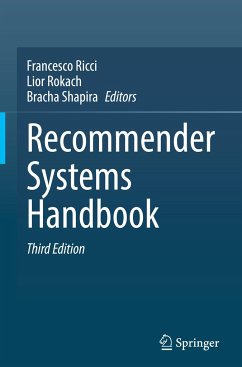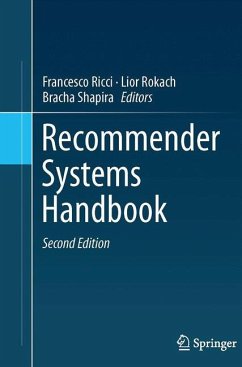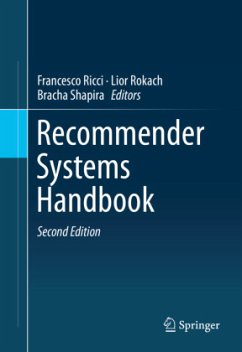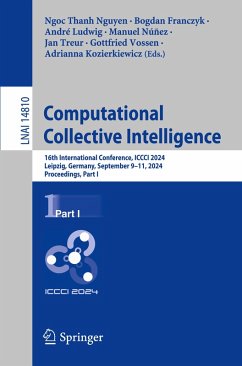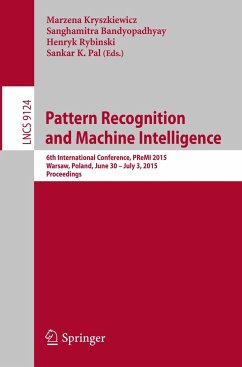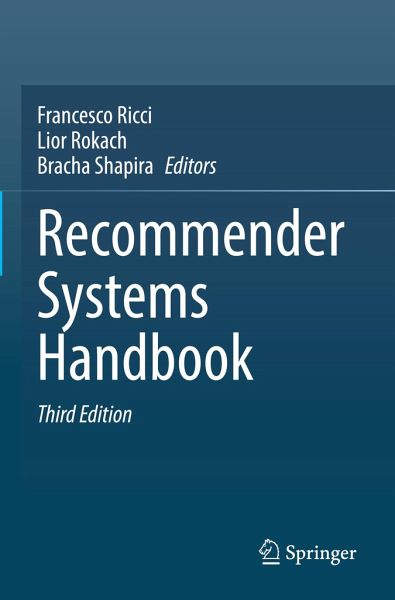
Recommender Systems Handbook
Versandkostenfrei!
Versandfertig in 6-10 Tagen
249,99 €
inkl. MwSt.

PAYBACK Punkte
125 °P sammeln!
This third edition handbook describes in detail the classical methods as well as extensions and novel approaches that were more recently introduced within this field. It consists of five parts: general recommendation techniques, special recommendation techniques, value and impact of recommender systems, human computer interaction, and applications. The first part presents the most popular and fundamental techniques currently used for building recommender systems, such as collaborative filtering, semantic-based methods, recommender systems based on implicit feedback, neural networks and context...
This third edition handbook describes in detail the classical methods as well as extensions and novel approaches that were more recently introduced within this field. It consists of five parts: general recommendation techniques, special recommendation techniques, value and impact of recommender systems, human computer interaction, and applications. The first part presents the most popular and fundamental techniques currently used for building recommender systems, such as collaborative filtering, semantic-based methods, recommender systems based on implicit feedback, neural networks and context-aware methods.
The second part of this handbook introduces more advanced recommendation techniques, such as session-based recommender systems, adversarial machine learning for recommender systems, group recommendation techniques, reciprocal recommenders systems, natural language techniques for recommender systems and cross-domain approaches to recommender systems. The third part covers a wide perspective to the evaluation of recommender systems with papers on methods for evaluating recommender systems, their value and impact, the multi-stakeholder perspective of recommender systems, the analysis of the fairness, novelty and diversity in recommender systems. The fourth part contains a few chapters on the human computer dimension of recommender systems, with research on the role of explanation, the user personality and how to effectively support individual and group decision with recommender systems. The last part focusses on application in several important areas, such as, food, music, fashion and multimedia recommendation.
This informative third edition handbook provides a comprehensive, yet concise and convenient reference source to recommender systems for researchers and advanced-level students focused on computer science and data science. Professionals working in data analytics that are using recommendation and personalization techniques willalso find this handbook a useful tool.
The second part of this handbook introduces more advanced recommendation techniques, such as session-based recommender systems, adversarial machine learning for recommender systems, group recommendation techniques, reciprocal recommenders systems, natural language techniques for recommender systems and cross-domain approaches to recommender systems. The third part covers a wide perspective to the evaluation of recommender systems with papers on methods for evaluating recommender systems, their value and impact, the multi-stakeholder perspective of recommender systems, the analysis of the fairness, novelty and diversity in recommender systems. The fourth part contains a few chapters on the human computer dimension of recommender systems, with research on the role of explanation, the user personality and how to effectively support individual and group decision with recommender systems. The last part focusses on application in several important areas, such as, food, music, fashion and multimedia recommendation.
This informative third edition handbook provides a comprehensive, yet concise and convenient reference source to recommender systems for researchers and advanced-level students focused on computer science and data science. Professionals working in data analytics that are using recommendation and personalization techniques willalso find this handbook a useful tool.





